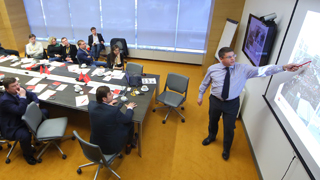
Szociális párbeszéd
A szociális párbeszéd a munkáltatók és munkavállalók bevonásával történő tárgyalások, konzultációk, közös intézkedések, megbeszélések és információmegosztás összességeként határozható meg. A jól működő szociális párbeszéd kulcsfontosságú eszköz a munkakörülmények számos, különböző szinten működő szereplő bevonásával történő alakításában. Egyensúlyt teremt a munkavállalók és a munkáltatók érdekei között, és hozzájárul mind a gazdasági versenyképességhez, mind a társadalmi kohézióhoz.
A közelmúltban az európai szinten folytatott szakpolitikai viták rámutattak arra, hogy különösen a 2008-as válság óta a társadalmi igazságosságról, a demokráciáról, a munkahelyek minőségéről és a munkaügyi kapcsolatok új modelljeiről folytatott új viták kihívások elé állították a hagyományos munkaügyi kapcsolatokat és a szociális párbeszéd rendszerét.
Harminc évvel azután, hogy a brüsszeli Val Duchesse kastélyban sor került az európai szociális párbeszéd történelmi jelentőségű életbe léptetésére, a Bizottság 2015. március 5-én az európai szociális partnerek részvételével megtartott magas szintű konferencián elindította a szociális párbeszéd új kezdetét. Az európai szociális párbeszéd egy uniós szociálpolitikai eszköz, amely közvetlenül hozzájárul az uniós munkaügyi jogszabályok és szakpolitikák alakításához.
- Az Európai Bizottság rendezvénye: A new start for social dialogue (A szociális párbeszéd új kezdete)
- Az Eurofound blogcikke: From Val Duchesse to Riga: how to relaunch social dialogue? (Val Duchesse-től Rigáig: hogyan indítsuk újra a szociális párbeszédet?)
















